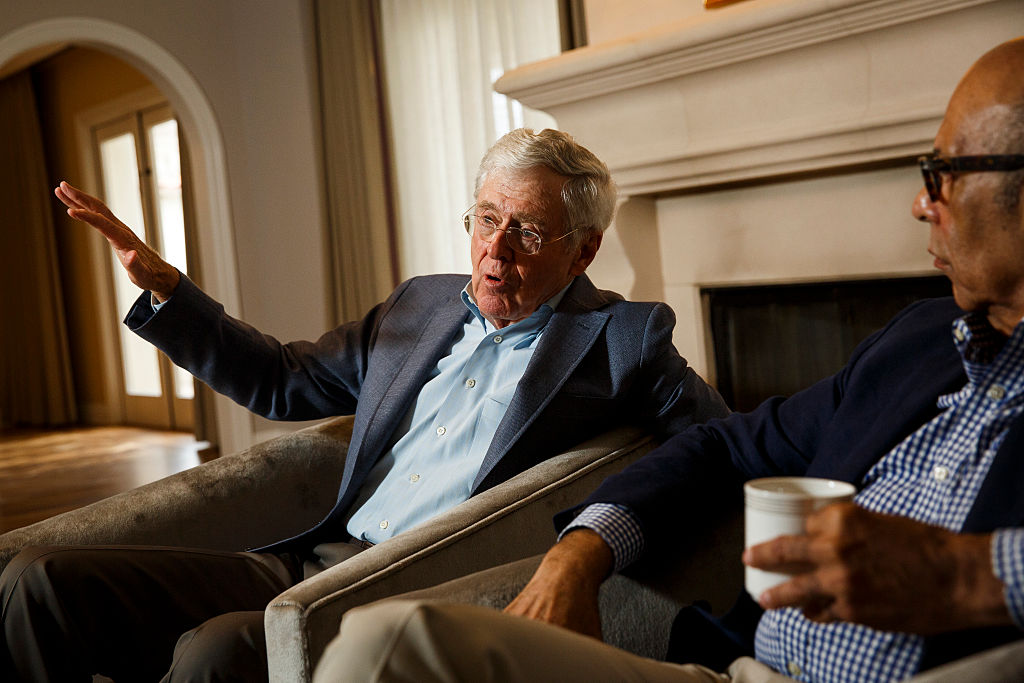When seemingly innocuous jargon turns out to be a Trojan Horse.
Follow the Money

Conservative donors need to take a hard look at where their dollars go.
Conservative philanthropy in America has long been on the defensive, mostly against harsh critiques from liberals and progressives. For big grantmakers on the Right—like the libertarian Koch brothers, the Olin, Bradley, and Scaife foundations, and a relatively limited number of others—criticism has been considered a given. It is almost like a necessary “transaction cost.”
But America’s establishment philanthropy, which has become monoculturallyprogressive, is now increasingly on the defensive too—mostly against harsh critiques from other progressives of a more populist sort. This is not really all that curious. Intellectually honest grassroots activists on the Left view “Big Philanthropy” as basically an exercise of illegitimate, anti-democratic power.
There is some current criticism of establishment philanthropy from among the populists ascendant on the Right as well. Too much of conservative philanthropy, however, remains steadfastly protective of the various special policy prerogatives and legal and cultural status of all philanthropy. This is a mistake. None of these privileges is a given. It is at least an open question whether they are in America’s best interest.
Fellow Travelers and the Direction of Travel
All grantmakers—Left, Right, and Center—face criticism for specific grants they’ve awarded. As often if not more so, they’re criticized for grants they’ve not awarded, or stopped regularly awarding, to a particular organization or cause. Rejected grant applicants and/or former grantee organizations, being peopled by humans, likely will have an opinion about the rejection. It may well be a harsh one. That’s all part of doing philanthropy. Such criticism is usually expressed in smaller circles, if at all, lest it do harm to any contemplated future (re-)requests.
A bigger concern arises, though, when an entire organization seems to be transforming its agenda under ideological pressure to contradict what donors think they are supporting. Just as there are good and bad ways to make grants, there are good and bad ways to reject grant requests, or to pivot the aims and concerns of a grantmaking program. The transformation of “New Koch” described here by Adam Kissel furnishes a potentially worrying example of the more ideologically motivated kind of change. This in turn gives rise to some further observations.
First, foundations on the Right have a history of tacking leftward, and there are very few examples of motion in the opposite direction. If you’re an existing or would-be donor and you have or will create a private foundation, this should add to the argument you’ll hear for “sunsetting” your foundation so as not to risk deviation from your donor intent after your death. Yet even living founders aren’t safe: the leftward drift can still apply while the original donor remains alive.
It follows that, if a foundation has a donor intent that it’s trying to effectuate through its grantmaking, trustees should perhaps be more cautious of joining donor clubs, groups, or associations that may bring pressure to bear on the freedom to do grantmaking in furtherance of that effect. Otherwise, as “New Koch” shows, programs may be vulnerable to unexpected shifts in emphasis. Other members of the club, group, or association will have different donors, and, just as a logical matter, it’d be odd if all of them had the same exact intent to effect.
If group membership is important to those attending its nice conferences in the mountains or at the oceanside, there’s a risk that their donor intent will become a sphere of meaning, not a point of meaning. The sphere is often inflatable enough to please the larger or fellow members looking at the same beautiful scene out the conference-ballroom window. And yes, if you’re the convener of the group and your intent is seen by recruited members to have changed—to be a whole new sphere—they might be inclined to leave discretely, not to return, and even to complain. There are other nicely situated and decorated ballrooms, after all, and donors have freedom.
Third, and relatedly, Kissel’s description and analysis of Koch’s criminal-justice grantmaking in particular underscores the inherent risks of working with and supporting what would be classified as unorthodox allies in pursuit of a particular issue. Doing so can facilitate a particular policy victory or achieve a given aim, but unless the parameters of the partnership are set very clearly, the long-term cost of success may be too high.
On the other hand, it’s not unheard-of for conservatives to work with and support unorthodox allies. For example, Milwaukee’s Bradley Foundation, where I served on the programming staff, cooperated with and funded onetime Maoists and current labor organizers and unionists in the early fight for school choice. Many liberals joined us in support of work-based welfare reform and other community-driven, grassroots efforts to deal with social ills. No conservative donor intent was violated—the pugnacious leadership wouldn’t have allowed it, you can be sure—and success was eventually achieved. But there was certainly clamorous criticism along the way: another “transaction cost.”
Tough Questions
Since November 2016, there has been some hesitant but helpful introspectionwithin conservative philanthropy as to how leadership was caught so apparently flat-footed by the rise of conservative populism and its causes. This has occurred, of course, as larger questions have been raised. Among them are such minor considerations as: What is our American identity? What is conservatism’s place within it? Relatedly: What’s the proper relationship between liberty, democracy, capitalism and commerce, and civil society? What’s real work worth? What’s a worker worth? What’s the news, and who gets to pick what’s fit to publish? For that matter: What’s a human? A man? A woman? A family?
Why can’t philanthropy similarly be questioned? The authors in this series, along with some others—notably including 2023 Bradley Prize recipient John H. Cochrane—are here to raise existential questions about philanthropy, including ones that need answering if “conservative philanthropy” is to flourish and retain the trust of its supporters by resisting institutional capture.
Along with some unsparing commentary and an aggressive proposal for philanthropy reform in 2021 by prominent populist conservative and later successful U.S. Senate candidate J. D. Vance, this kind of questioning appears to have had an effect. A mid-April Chronicle of Philanthropy op-ed by six leaders of top American philanthropies and foundation associations, entitled “We Disagree on Many Things, but We Speak With One Voice in Support of Philanthropic Pluralism,” proposed five “principles to help guide a rigorous and respectful discourse among philanthropies, especially those that approach issues from different perspectives”—according to the first one of which “we should not question the underlying legitimacy of any foundation or philanthropist holding a particular view.”
The piece’s authors are the John Templeton Foundation’s Heather Templeton Dill, the Council on Foundations’ Kathleen Enright, the Doris Duke Foundation’s Sam Gill, the Koch-created Stand Together’s Brian Hooks, the Ford Foundation’s Darren Walker, and the Philanthropy Roundtable’s Elise Westhoff.
Much of their op-ed laudably calls for respectful engagement among philanthropic institutions of differing worldviews. But it also seeks in its one voice to promote, protect, and defend an understanding of donor freedom that would prevent anything like the Cochrane- or Vance-floated reform. “We reject efforts by anyone to circumscribe or proscribe the programmatic prerogatives of donors or their foundations, so long as the exercise of those prerogatives conforms with the law,” according to their fifth agreed-upon principle.
In every area of American life—from Big Tech, Big Business, to globalization and ESG, to education and media—our more complacent conservative friends need a little galvanizing. They need to be asked: Do you know what time it is?
When it comes to philanthropy, it is time to fight back at least a little against what’s being done by and through tax-incentivized philanthropy. Of course we should fight with fairness, honesty, respect, dignity, kindness, and good nature—and, if possible, along with a pluralistic coalition of unorthodox and perhaps even wary-but-willing progressive allies. But we ought to pull no punches.
For those acting on this answer to the question, any resulting additional “transaction costs,” metaphorical or actual, will be well worth incurring. For conservatism, yes, but also the country.
The American Mind presents a range of perspectives. Views are writers’ own and do not necessarily represent those of The Claremont Institute.
The American Mind is a publication of the Claremont Institute, a non-profit 501(c)(3) organization, dedicated to restoring the principles of the American Founding to their rightful, preeminent authority in our national life. Interested in supporting our work? Gifts to the Claremont Institute are tax-deductible.
A foundation veers left.


